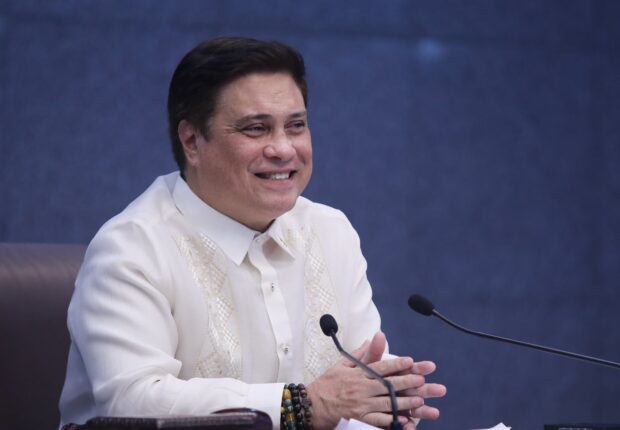
Senate President Juan Miguel Zubiri (File photo from the Senate Public Relations and Information Bureau)
MANILA, Philippines — Senate President Juan Miguel Zubiri asserted Monday that President Ferdinand Marcos Jr. is “very clear” that he wants Congress to vote separately on amendments to the Constitution.
In an ambush interview, Zubiri said Marcos was aware that the chambers of Congress – the Senate and the House of Representatives – must vote independently on Charter change (Cha-cha).
“The president knows that. He knows it’s supposed to be voted [separately]. He said obviously…there might…somebody might question it to the Supreme Court whether voting separately or voting jointly,” he said.
READ: Marcos ‘not as warm as usual’ in latest meeting with senators – source
“As far as we’re concerned, we will cross the bridge when we get there. As far as we’re concerned, [it’s] voting separately and we will vote separately,” he stressed.
Resolution of Both Houses (RBH) No. 6, which is a measure proposing specific amendments to the economic provisions of the Constitution, is being discussed in the Senate upon the directive of Marcos.
RBH6 specifically states that voting on any amendments to the Constitution must be done independently by the Senate and the House of Representatives.
A similar measure – RBH 7 – was filed in the lower chamber earlier this month, but it simply states that changes to the Constitution should be approved by a vote of three-fourths of all its members.
READ: Senate manifesto nixes people’s initiative, warns of no-el scenario
But did the president categorically state that he wants Congress to vote separately on Charter change?
“The President is very clear with that. It’s voting separately – bicameral. Did you listen to his speech? When he signed it, he said that bicameralism is strong. With both houses, it’s really voting separately,” Zubiri emphasized.
Senators previously expressed apprehension about joint voting, noting that more than 300 House members could easily outvote the 24-member upper chamber.
The Senate likewise noted that allowing Congress to vote jointly would “destabilize the principle of bicameralism and the system of checks and balances.”